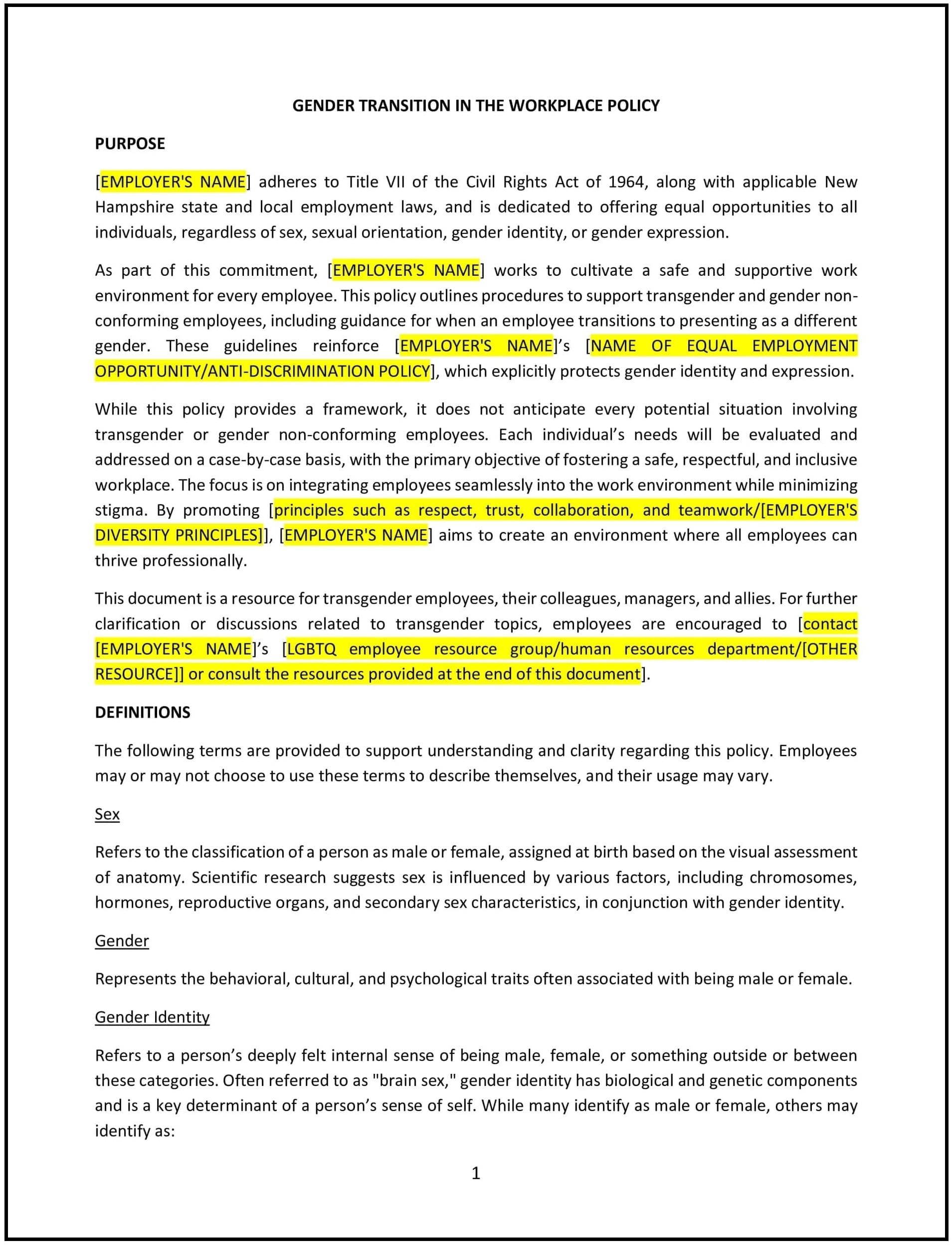Gender transition in the workplace policy (New Hampshire): Free template
Got contracts to review? While you're here for policies, let Cobrief make contract review effortless—start your free review now.

Customize this template for free
Gender transition in the workplace policy (New Hampshire)
A gender transition in the workplace policy helps New Hampshire businesses support employees who are transitioning in their gender identity. This policy outlines the steps the business will take to create an inclusive, respectful, and supportive environment for employees undergoing gender transition, ensuring they are treated with dignity and fairness throughout the process.
By adopting this policy, businesses in New Hampshire can foster an inclusive workplace culture, reduce discrimination, and provide employees with the resources they need to navigate their gender transition smoothly and confidently.
How to use this gender transition in the workplace policy (New Hampshire)
- Define gender transition: Provide a clear definition of gender transition, including what it involves and the different ways employees may transition, such as changing their name, pronouns, appearance, or gender expression.
- Address confidentiality: Outline how the business will handle confidential information about an employee's gender transition, ensuring that the employee’s privacy is respected and maintained throughout the process.
- Establish communication protocols: Specify how employees can inform the business about their transition and establish clear guidelines for communication within the workplace, including when and how the employee would like their colleagues to be informed.
- Provide workplace accommodations: Identify potential accommodations for employees transitioning, such as changes to restroom access, uniforms, or job assignments, and outline the steps for requesting such accommodations.
- Set expectations for respectful behavior: Emphasize the importance of respect, inclusivity, and the use of preferred names and pronouns. Provide guidelines for addressing any instances of harassment or discrimination.
- Offer training and support: Provide training to managers and staff on gender identity and the transition process to create a more informed and supportive workplace. Offer counseling or other resources for employees undergoing gender transition, if applicable.
- Review and update: Regularly review and update the policy to reflect changes in New Hampshire state laws, federal regulations, or company practices, ensuring that it remains effective and inclusive.
Benefits of using this gender transition in the workplace policy (New Hampshire)
This policy provides several benefits for New Hampshire businesses:
- Promotes inclusivity: A gender transition policy helps create a more inclusive and welcoming workplace for employees of all gender identities, fostering diversity and a sense of belonging.
- Reduces discrimination and harassment: By establishing clear expectations for respectful behavior and providing guidelines for addressing discrimination, businesses can reduce the likelihood of workplace conflicts or issues.
- Improves employee retention: A supportive environment for employees undergoing gender transition helps improve job satisfaction, reduces turnover, and builds loyalty among employees.
- Enhances company reputation: Businesses that implement inclusive policies are seen as leaders in promoting diversity and equality, which can improve their reputation and attract diverse talent.
- Complies with legal requirements: Having a clear policy on gender transition helps businesses meet legal obligations related to workplace discrimination and employees’ rights, reducing the risk of legal challenges.
Tips for using this gender transition in the workplace policy (New Hampshire)
- Communicate the policy clearly: Ensure all employees are aware of the gender transition policy, understand their rights and responsibilities, and know the steps to take if they need support.
- Train managers and employees: Provide training on gender identity, inclusive behavior, and how to support employees undergoing gender transition. Encourage the use of preferred names and pronouns to create a respectful environment.
- Offer flexibility: Be flexible in accommodating employees who are transitioning, such as allowing them to use the restroom that corresponds with their gender identity or adjusting uniform requirements.
- Encourage open communication: Create an open line of communication between employees and HR or management so that employees feel comfortable requesting accommodations or reporting concerns.
- Monitor the policy’s effectiveness: Regularly review the policy’s impact and gather feedback from employees to ensure that it is helping create a supportive, inclusive, and respectful workplace.